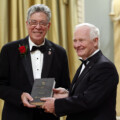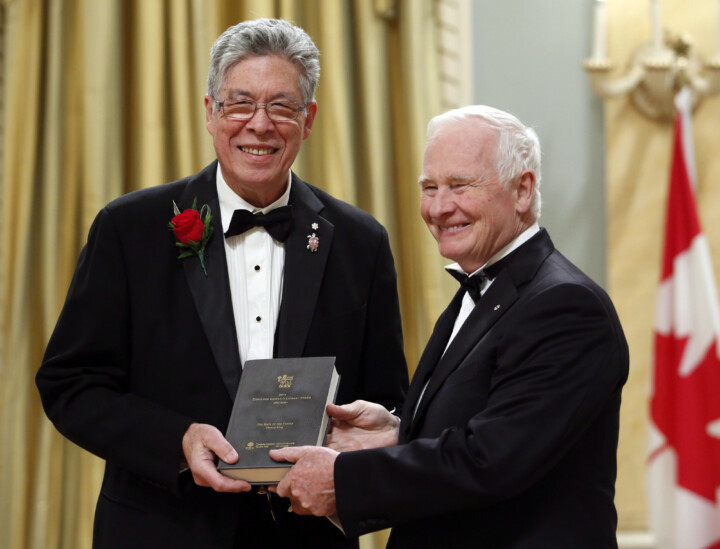Every now and then, we hear something insightful or powerful that stops us in our tracks. Those moments are striking, especially when what was said should be considered an obvious truth instead of a groundbreaking discovery.
I had this experience recently when, during a lecture at the university where I work, a distinguished speaker said that Canada is a good country. The statement caused a visceral reaction in me. I found myself at the same time in total agreement with the speaker, but also acutely aware that it has become controversial in certain circles to describe Canada in this way. I wondered, with some trepidation, how this statement landed with the rest of the audience.
There was a time, not long ago, when it seemed like most Canadians openly expressed their affection for Canada, even if they usually did so in understated ways. We stitched the Canadian flag to our backpacks when setting off on a trip abroad. We enjoyed talking about Canada to people we would meet during those trips. We beamed with pride when fellow Canadians punched above their weight in the arts, sciences, and countless other fields and disciplines.
But in recent years we have witnessed a palpable increase in the sentiment opposite to the one conveyed by that speaker I heard. We have been invited not simply to reflect upon and acknowledge various historical wrongs that have taken place in Canada, but to endorse the notion that Canada is inherently flawed and unjust. We have been told, in essence, that Canada is not a good country and never was.
There is no question that profound wrongs have been committed in Canada. The disgraceful treatment of Indigenous persons, detailed in the reports by the Truth and Reconciliation Commission, sits at the top of the list. Many other minority groups have been marginalized and subjected to discrimination over the decades. There is no shortage of moments in which we have, either as a country or as individuals who live within it, severely harmed others in our midst.
We should not skate past these failures. They must be confronted and transformed into avenues for healing and growth. In many ways, we are showing maturity in this regard and taking meaningful steps to bind our societal wounds and chart a path toward a more harmonious future together. But we should not write off Canada in the process. In doing so, we risk opening new wounds and falling off this path.
In fairness, negative attitudes toward Canada are not the monopoly of any side of our political spectrum. While some progressives focus on our original sins as a country, certain voices—often situated on the Right—suggest that Canada has more recently lost its way. These voices, in making this claim, often point to matters like social cohesion, moral concerns, and civil liberties. I have, for my part, spoken from this vantage point on the matter of euthanasia and the threat I believe it poses to Canada.
I worry that some of these voices, regardless of where they sit on the political spectrum, go well beyond constructive criticism of Canada. They seem to have wandered into the realm of condemning Canada and, as a result, expressions of “true patriot love” for this country.
This rhetoric is distressing not only because of its toxic effects on our social fabric and civic ecosystem, but because that speaker I heard was fundamentally correct: Canada is indeed a good country.
Canada’s levels of economic prosperity, life expectancy, and peaceful coexistence are among the highest in the world. Canada ranks “very high” in the Human Development Index—15th out of 191 countries. Freedom House gives Canada a 98 percent mark on political rights and civil liberties. The U.S. News and World Report on quality-of-life ranks Canada as number three in the world.
These results do not happen by accident, and they do not disappear overnight. They are the fruits of a society that is intimately concerned with cultivating human flourishing and protecting human dignity. Chief Justice Brian Dickson of the Supreme Court of Canada put it well when he articulated some of the principles that animate Canada as a free and democratic society:
[R]espect for the inherent dignity of the human person, commitment to social justice and equality, accommodation of a wide variety of beliefs, respect for cultural and group identity, and faith in social and political institutions which enhance the participation of individuals and groups in society.
For these principles to come to life, individuals must breathe into them. By and large, Canadians have consistently done so. When tragedy strikes, we come together. When injustice occurs, we pursue reconciliation. We cherish fraternal solidarity over rugged individualism. We foster and promote diversity and pluralism. Owing often to our human weakness, we have not always lived up to these commitments. But the mark of a good country, perhaps, resembles the mark of a good person: not the possession of a perfect track record so much as a willingness to learn from one’s failures and a sincere commitment to doing better.

Canada is overwhelmingly filled with people of this sort. They are, first and foremost, what makes Canada a good country. Standing behind those international rankings that make us proud to be Canadian are millions of people who tirelessly strive, in the circumstances of their daily lives, to make the society all of us hope for the society in which we live. These “ordinary Canadians” are indeed extraordinary. They are the heartbeat of a country so often admired around the world.
Canada faces many challenges and is far from perfect. Much work remains to heal deep wounds and for Canada to reach its full potential. But Canada is also, objectively speaking, exceptional. Scholar and historian Margaret Conrad captures this tension with these words: “There are injustices in the nation’s past so mean-spirited that they are difficult to believe. At the same time, it must be conceded that Canada is one of the most successful nations on Earth, a country where people from all over the world have found opportunities for community and individual fulfilment.”
A good country humbly admits and grapples with these realities. Imbued with a spirit of optimism, it affords its citizens the right to criticize and remedy its shortcomings and the freedom to celebrate and cherish its accomplishments. Pierre Trudeau once put it this way: “Our hopes are high. Our faith in the people is great. Our courage is strong. And our dreams for this beautiful country will never die.”
Canada is, without a doubt, a good country. Truth be told, it is one of the best.
Recommended for You

The Thomas King saga proves Canada’s cultural establishment must end its identity obsession once and for all

Should Israel support a two-state solution? The Munk Debates prove open discussion is still possible

‘This is going to get very messy’: Will Canada drop religious protections from its hate speech laws?

The question is not whether liberty should be ordered, but how




